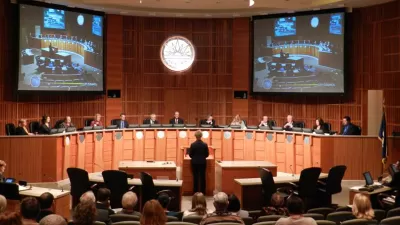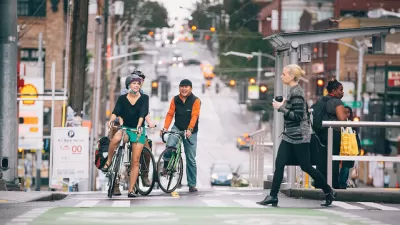Tom DiChristopher reports on a pioneering project in New York City that gives the residents of four City Council districts a direct vote on how to allocate municipal funds.
The pilot program, a first for New York City, provides residents with an opportunity to decide how to spend up to $1 million in capital funds on physical improvements in their communities, such as planting trees or installing security lights.
Following on similar projects in Toronto and Chicago, "the New York City project is the brainchild of Josh Lerner, co-director of the nonprofit Participatory Budget Project. Lerner brought the idea to politicians and community leaders in 2010", with the goal of getting residents more involved in government, writes DiChristopher.
"Since November, budget delegates have whittled down the ideas that came out of community meetings, considering only those that meet the city's criteria for capital funding. They met with experts from city agencies, community organizations and nonprofits to flesh out projects and set budgets.
The budget delegates sent their final list of projects to city agencies for review. They'll present the approved projects to their communities through the middle of March."
FULL STORY: Project Has Citizens Making Budget Choices

Maui's Vacation Rental Debate Turns Ugly
Verbal attacks, misinformation campaigns and fistfights plague a high-stakes debate to convert thousands of vacation rentals into long-term housing.

Planetizen Federal Action Tracker
A weekly monitor of how Trump’s orders and actions are impacting planners and planning in America.

San Francisco Suspends Traffic Calming Amidst Record Deaths
Citing “a challenging fiscal landscape,” the city will cease the program on the heels of 42 traffic deaths, including 24 pedestrians.

Adaptive Reuse Will Create Housing in a Suburban Texas Strip Mall
A developer is reimagining a strip mall property as a mixed-use complex with housing and retail.

Study: Anti-Homelessness Laws Don’t Work
Research shows that punitive measures that criminalized unhoused people don’t help reduce homelessness.

In U.S., Urban Gondolas Face Uphill Battle
Cities in Latin America and Europe have embraced aerial transitways — AKA gondolas — as sustainable, convenient urban transport, especially in tricky geographies. American cities have yet to catch up.
Urban Design for Planners 1: Software Tools
This six-course series explores essential urban design concepts using open source software and equips planners with the tools they need to participate fully in the urban design process.
Planning for Universal Design
Learn the tools for implementing Universal Design in planning regulations.
Heyer Gruel & Associates PA
JM Goldson LLC
Custer County Colorado
City of Camden Redevelopment Agency
City of Astoria
Transportation Research & Education Center (TREC) at Portland State University
Jefferson Parish Government
Camden Redevelopment Agency
City of Claremont





























